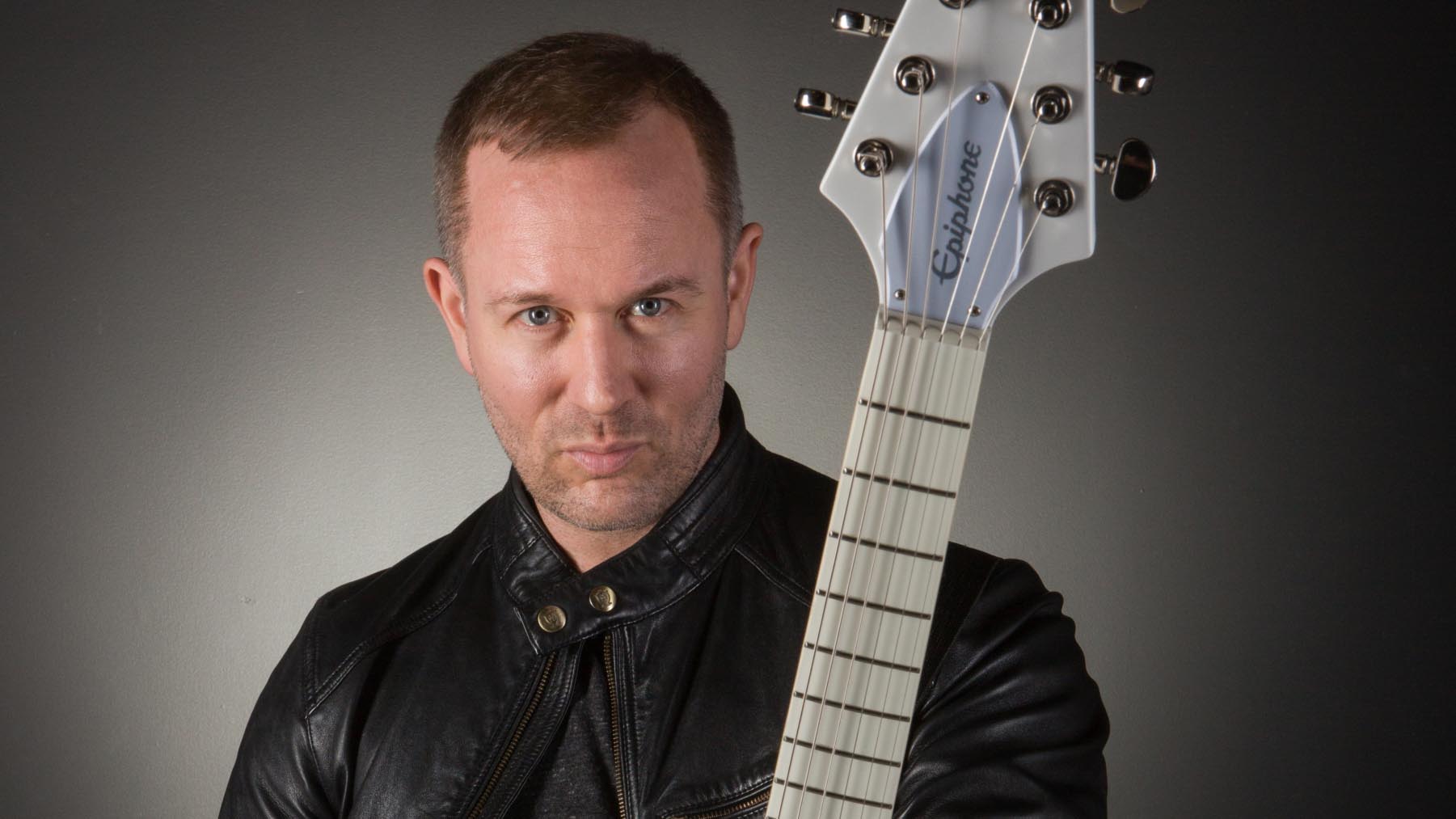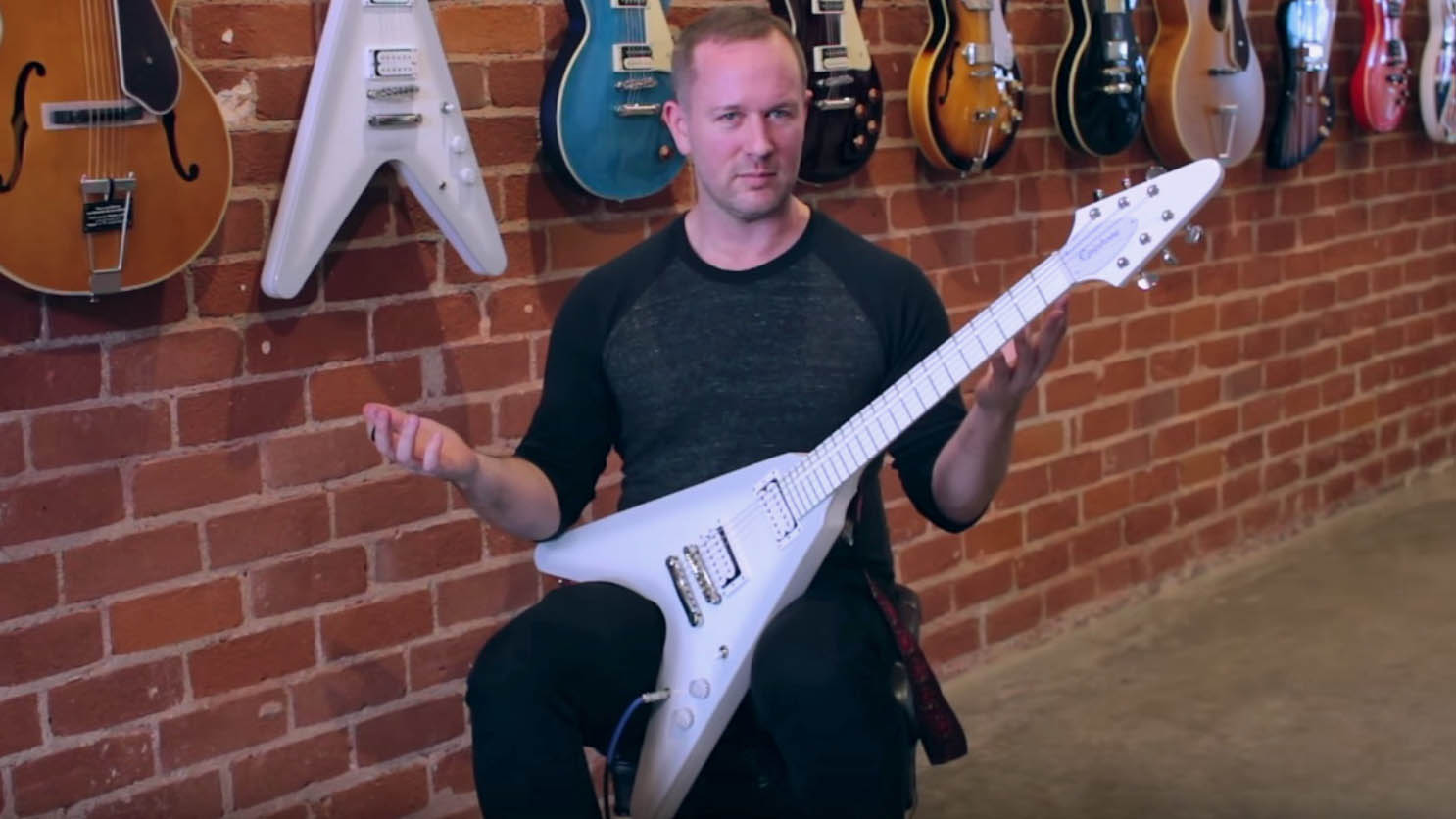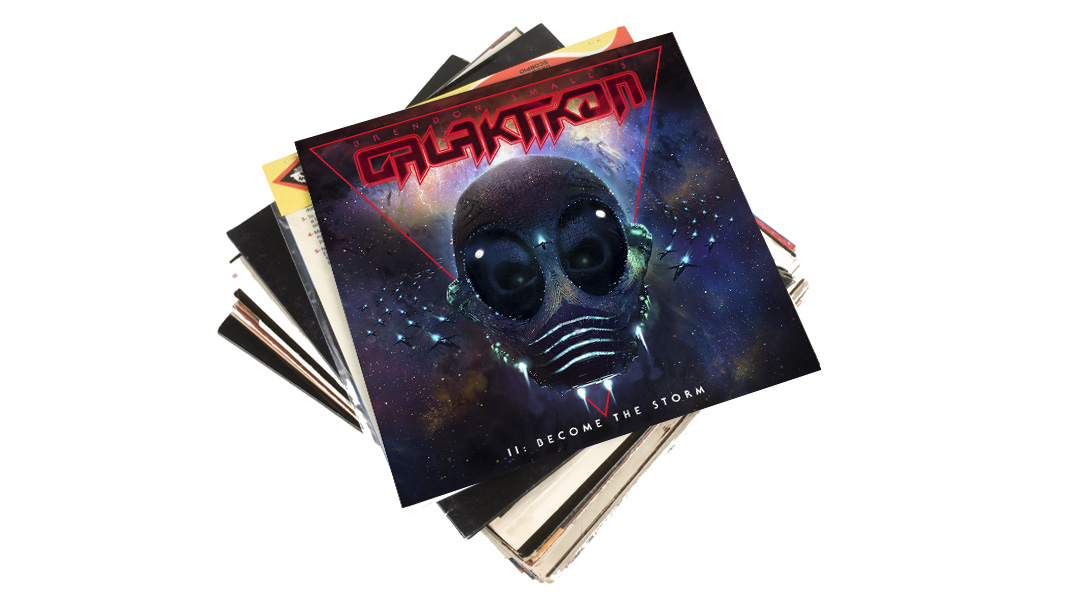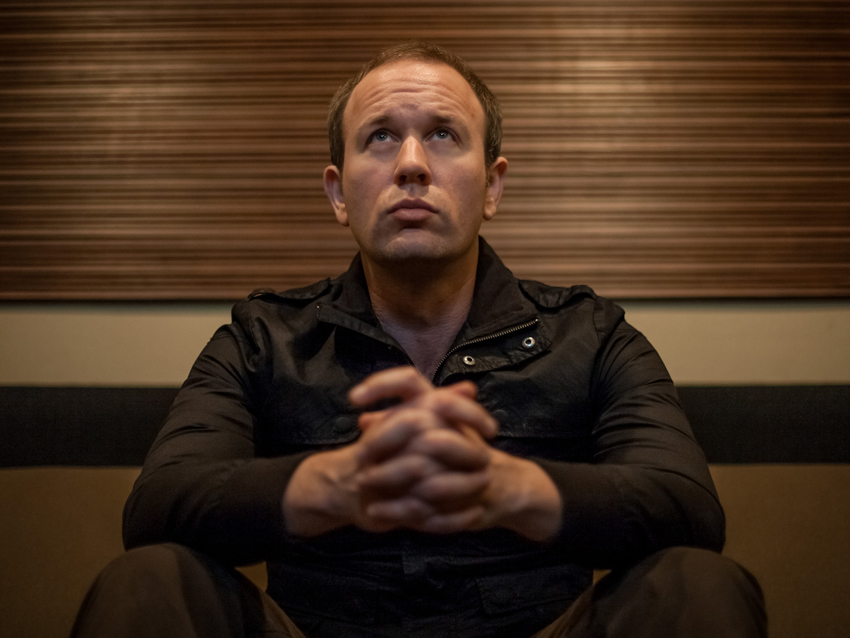Brendon Small: my top 5 tips for guitarists
Dethklok and Galaktikon mastermind shares electrifying guidance

In 2010, Brendon Small - the musician and writer behind Metalocalypse’s virtual/cartoon band Dethklok - got a phone call that changed his life.
On the other end was the manager of his favourite group, bringing welcome news of their reunion and an even more jaw-dropping invitation to direct their next video. That band were Soundgarden and it would be for their lost track Black Rain, originally written during the Badmotorfinger era. It was their first single in 13 years, so naturally Brendon couldn’t quite believe what he was hearing…
“They’re one of my favourite bands of all time,” he says.
“I think there was an influence on even the first Galaktikon record I put out and I think it’s on the new record as well. I ended up having a long conversation with Kim [Thayil, guitarist], we were on the phone for three hours talking about Zappa, the Melvins, monster movies, sci-fi stuff… and it turns out that everyone is into comedy. And why shouldn’t they be? Between guitars and comedy, what else do you want out of life?!”
Not long after, he was invited to meet the childhood heroes he was now working with…
“Then I finally met Chris after the video was finished,” continues Brendon.
“They did this tiny show to 200 people sponsored by Guitar Hero, who funded the video. We mainly spoke about technical vocal stuff, how his voice, pitch and technique were still so strong after all these years. He talked to me about his warm-up routines and I was a little intimidated because this tall, lanky guy I worshipped was talking to me.
“After that, I went to see them do two nights in a row in Los Angeles, on the side of the stage looking at all the different tunings they would use, stuff like ones and fives… like an E, a couple of Bs and more Es. It was like one huge powerchord!”
The news of Chris Cornell’s passing earlier this year came as a massive shock to rock fans all over the world. For Brendon, it was especially heartbreaking given his admiration for Chris as a hero and now as a friend…
“What a horrible tragedy, it’s such a shame,” he says.
“Here’s what I hope: they are such an important rock band, I want the music to live on. In my mind, I’d love to see a benefit show for suicide prevention where the remaining members play with a bunch of singers to raise money and awareness.
“It’s like what Queen did after Freddie died, letting the music live on. No-one can sing like Chris, but then again, who could sing like Freddie Mercury? People took a crack at it and sounded fantastic.”
As for more current endeavours, the comedy writer/voice actor/musician/guitarist/producer is back with second Galaktikon full-length Become The Storm.
He has stated it will effectively serve as the new Dethklok album following complications over rights to the name - otherwise, it’s business as usual… expect only more of heavy metal mastery he built his name on.
“I had a couple of Gibson prototype Explorers built for me,” he reveals. “One is called a Snowhorse: it’s an all-white Explorer with Seymour Duncan Full Shred pickups, which believe it or not are medium output.
I divide my brain a bit… One side has been writing jokes and characters in comedy for the best part of 20 years, and the other has been practising guitar to the same extent
“For my leads, I used the Andy Timmons AT pedal made by JHS. It has a warmer, creamier sound that what’s associated with metal currently, which is why I think this record is a little warmer than other heavy sounds coming out right now.
“I also used the EVH distortion pedal for all my rhythm guitars, going into a Marshall Satriani JVM. They have a very reliable and consistent sound that isn’t too compressed and more open.
“There was also a Line 6 Helix for a couple of clean, swirly things… once I got the Impulse Responses, it really came to life and I’ve become a big fan of it.”
For Brendon, comedy and music have been two different sides of the same coin, in many ways using one to launch the other. Though it may be one of the more unconventional avenues to rock stardom, it’s clearly one that worked well for him…
“I divide my brain a bit,” he laughs.
“One side has been writing jokes and characters in comedy for the best part of 20 years, and the other has been practising guitar to the same extent.
“So if I’m selling a TV show about a band, the music has to be great. If the band sucks, the show will suck. Luckily for me, even though it wasn’t necessarily meant to do this, the music took off on its own… which is fun because I love playing guitar!”
Here the musician gives us his five tips to musical godliness…
Galaktikon II: Become The Storm is out on 25 August via Megaforce Records/MRI, and available to preorder on iTunes and Amazon.

1. Learn your inversions
“I use a lot of chord voicings, which I think brings a lot of personality to your band - even if you’re tuned down to C standard with gallons of distortion. For rhythm guitar, Brian May’s use of first inversions really opened my mind… I might use the third as my bass note, for example.
“Listening to how me and [bassist] Bryan Beller work together, we call it fingered bass - we do a lot of travelling on the same chord. Though I usually stay away from the fifth! I like to re-harmonise my ideas through different inversions of the same chord - which makes you able to play the same riff over and over again but make it feel different.
“It’s not that sexy, but it will change your sound. Everybody from Queen to Weezer uses this technique and, for some reason, my ears really gravitate towards that.”
2. Put yourself in a position of potential failure
“Always try to work on techniques you can’t do… it’s all about the things you can’t quite grasp and need to work towards. That’s how to change the way you sound.
Pick attack can get really annoying very quickly, but if you throw in enough legato and economy you can offset the aggression
“For the last few years, I’ve been working through Brett Garsed’s techniques or Tom Quayle, who does great instructional videos, to what Frank Gambale and Dweezil Zappa do with their economy picking.
“It’s all about smart legato phrasing for me. I try to get a lot of legato in there. Pick attack can get really annoying very quickly, but if you throw in enough legato and economy you can offset the aggression. You want to create that dynamic range.
“It’s like, ‘This is what my guitar sounds like with no pick and here it is scratching away, making all this noise, bonking and breaking things!’ So it’s important to challenge yourself and always work on these new techniques.”

3. Master the art of dynamics
“How do you create dynamics with a guitar at full volume? If you think about it, you’ll need to find the quietest way to play as much the loudest. Even with screaming vocals and death-metal drums, you can bring a nice sense of dynamics to the guitars.
“For example, find a way to play a series of long notes and then contradict them with short notes. Contradiction is an important part of it. If everything you play is just fast, it won’t mean anything. Same if it’s all slow, so mix the two to write a cool solo that’s actually worth listening to.”
4. Melody is all you have
“This is something I learned a long time ago. After the first Dethklok record, I’d used up all the licks I’d learned during my teenage years! All the Paul Gilbert, Yngwie Malmsteen and John Petrucci licks had been recorded. It was like I ripped those guys off and was left with nothing! What I learned is that all you have is your sense of melody… that’s what will carry you through a career.
“It’s a bit like a sense of humour: you either have it or you don’t. If there’s enough, what you can do is develop it to the best it can be. Look at Eric Johnson - his sense of melody is impeccable. He also finds ways to make notes stick out by jumping through intervals, with big leaps like Brian Wilson from The Beach Boys: low, high, low, high, et cetera.
I keep going back to Brian May’s solos. He can build a song within a song for 17 seconds every time, and they end up being so memorable
“It’s the simple things that are important - the same goes for fast, slow, loud, quiet, et cetera. Develop that melody by paying attention to your favourite guitar players - analyse why what they’re doing works so well.
“I keep going back to Brian May’s solos. He can build a song within a song for 17 seconds every time, and they end up being so memorable. Or Yngwie, on that first record, I don’t think I could find more melodically and intervallically interesting lines.
“Sometimes they might be consecutive notes of a scale - one of the strongest things in the world is Paul McCartney playing a major scale in The Beatles. It just works, and that’s so much more interesting than a wad of fast notes with sweep arpeggios and double tappy things.
“When I went to Berklee [College of Music], they would teach us things like playing a scale with random notes an octave up or down, but still in order - mixing up the notes in a really interesting way.”
5. It’s not rocket science
“If there’s something wrong with your playing, there’s usually a simple answer. The guitar is a logic-based instrument. No-one gets really good at it through magic! Some people gravitate to it faster, but no-one is a wizard; they’ve just spent longer in their bedroom practising.
“If you spend time solving problems, you’ll get a lot of rewards. So the ultimate tip is pay attention to yourself, listen to yourself and be honest with yourself. I’ll hear an old record and wince at the same place every time knowing I could have nailed it better.
“But remember no one is telling you to be a guitar player… no-one cares! Be your own director, editor and executive producer. Be your own boss; that will help a great deal. Record yourself, be critical and be nice to yourself. Keep challenging yourself to do things you couldn’t yesterday. Hold yourself to a higher regard, because no-one else is going to.
“If your heroes can do something great, shouldn’t you hold yourself to that same regard? May, Petrucci, Malmsteen… would they allow that kind of playing for themselves if they were in your shoes?”
Amit has been writing for titles like Total Guitar, MusicRadar and Guitar World for over a decade and counts Richie Kotzen, Guthrie Govan and Jeff Beck among his primary influences. He's interviewed everyone from Ozzy Osbourne and Lemmy to Slash and Jimmy Page, and once even traded solos with a member of Slayer on a track released internationally. As a session guitarist, he's played alongside members of Judas Priest and Uriah Heep in London ensemble Metalworks, as well as handling lead guitars for legends like Glen Matlock (Sex Pistols, The Faces) and Stu Hamm (Steve Vai, Joe Satriani, G3).

